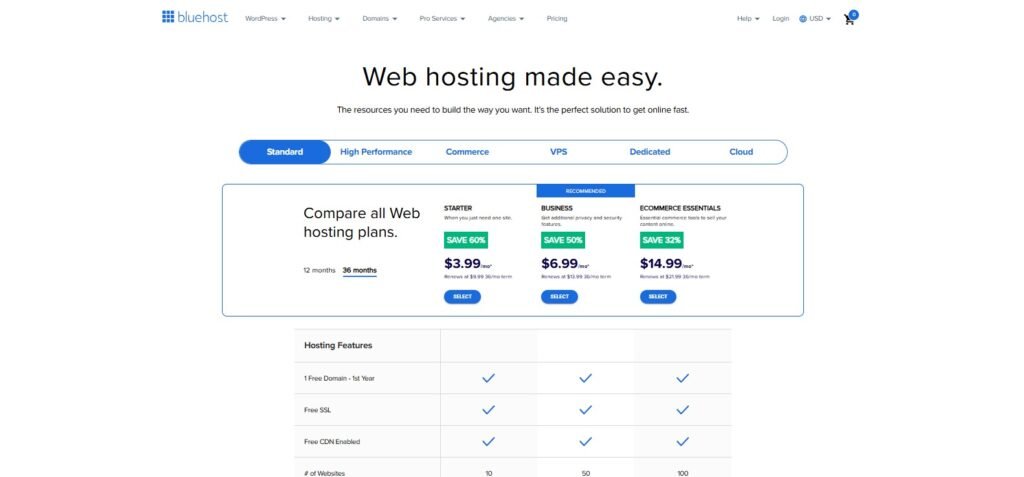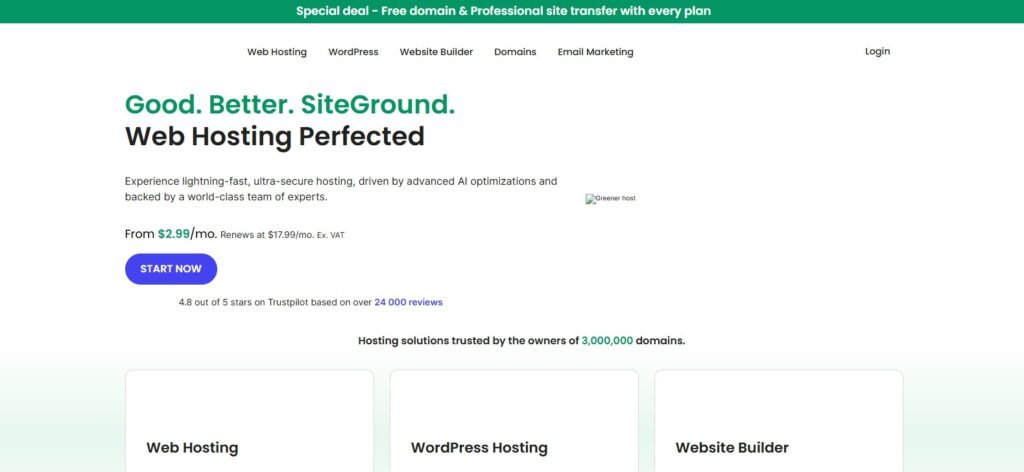When you think about building a website, the first three essentials you need are web hosting, a domain name, and an SSL certificate. Without these, your online presence is incomplete. Many beginners feel confused at the start because these terms sound technical, but in reality, they are quite straightforward once explained.
What Is Web Hosting?
Imagine your website as a digital house. Just like a house needs land to stand on, your website needs a space on the internet to live. This “space” is provided by a hosting company. Web hosting stores all your website’s files, text, images, and code on a secure server. Whenever someone types your website address in a browser, the hosting server delivers the content to their screen.

Without hosting, your website simply cannot exist online. Hosting plans come in different types such as shared hosting (budget-friendly for beginners), VPS hosting (for growing websites), and cloud hosting (for maximum performance and scalability).
What Is a Domain?
If hosting is the land, the domain is your home address. It is the unique name that visitors type into their browser to reach your site, for example, mywebsite.com. Without a domain, people would have to use a complicated series of numbers (IP addresses) to find you. That’s why having a clear, simple, and memorable domain name is so important for branding.
What Is an SSL Certificate?
SSL stands for Secure Sockets Layer. This technology creates a secure connection between your website and its visitors. If you have ever noticed a small lock symbol before a website’s URL or the HTTPS prefix, that’s SSL in action.
Why does it matter?
It protects sensitive data like passwords, payment details, and personal information.
It shows visitors that your site is trustworthy.
Google has confirmed that SSL is a ranking factor, meaning websites with SSL are more likely to appear higher in search results.
Why Free Domain and SSL Are Valuable
Buying a domain separately can cost $10–$15 per year, and SSL certificates may cost even more. Hosting providers that bundle a free domain and SSL save you money and time, especially if you are a beginner. You get everything in one package, and your site is ready to go live much faster.
In short, web hosting, a domain, and SSL are the three pillars of a strong online presence. The next parts of this guide will show you why hosting plans that include free domain and SSL are the smartest choice, what features to look for, and which providers deliver the best value.
Benefits of Hosting Plans That Include Free Domain & SSL
When you are just starting a website, every dollar saved makes a big difference. That’s why choosing a hosting plan that bundles a free domain and SSL certificate is a smart move. It doesn’t only save money but also ensures your website has the professional foundation needed to succeed. Let’s explore the main benefits.
1. Cost Savings From Day One
Buying a domain name separately usually costs between $10–$15 per year. Meanwhile, SSL certificates range anywhere from $10 to $70 per year depending on the provider. By choosing a hosting plan that includes both for free, you can save a considerable amount of money — especially during your first year online. These savings are particularly valuable for bloggers, small businesses, and startups that operate on tight budgets.
2. Hassle-Free Setup for Beginners
For beginners, setting up a website can feel overwhelming. Purchasing hosting, buying a domain, and then configuring SSL one by one takes time and effort. Bundled hosting plans eliminate this complexity. Within a few clicks, you get hosting, a registered domain, and an SSL certificate all connected and ready to use. This convenience helps you launch your website faster and focus on creating content rather than worrying about technical details.
3. Improved Search Engine Rankings
Google has made it clear: websites with SSL (those using HTTPS) are given preference in search rankings compared to sites running on HTTP. Having SSL from the very beginning ensures your website is on the right track for better visibility. Pair this with a custom domain and solid hosting performance, and you already have the SEO basics in place.
4. Stronger Trust and Security
A padlock symbol in the browser instantly tells visitors that your website is safe. This is essential for building trust, especially if you run an e-commerce store, accept payments, or collect user data. Even if you only run a personal blog, SSL prevents data interception and boosts your professional image. When users trust your website, they are more likely to stay longer, return often, and engage with your content.
5. Professional Branding and Credibility
Using a free subdomain like yourname.hostingcompany.com looks unprofessional. A unique domain name gives your brand authority and credibility. Combined with SSL, your site looks polished and reliable. For small businesses, this makes a huge difference in how potential customers perceive you.
6. Future-Ready Online Presence
As your website grows, scalability and security become even more important. Having SSL from day one means you won’t need to migrate later or worry about compatibility issues. A free domain also sets the foundation for building branded email addresses such as info@yourdomain.com, which further enhances your business identity.
Features to Look For in a Hosting Plan
Not all hosting plans are created equal. Just because a provider offers a free domain and SSL doesn’t mean the plan will give you the performance and reliability your website needs. To avoid future problems, you should carefully evaluate the features included in a hosting package before making a decision. Here are the most important factors to consider:
1. Storage and Bandwidth
Storage: This determines how much data (text, images, videos, emails) your website can hold. Look for SSD-based storage because it offers faster loading times compared to traditional HDD storage.
Bandwidth: This controls how much data can be transferred from your site to visitors. Unlimited or high bandwidth ensures your website won’t crash during traffic spikes. If you expect steady growth or seasonal visitors (like during holiday sales), bandwidth becomes crucial.
2. Uptime Guarantee
A website that frequently goes offline will lose both visitors and potential revenue. Reliable hosting companies usually offer a 99.9% uptime guarantee. This means your site is available nearly all the time. Before buying a plan, check user reviews to confirm the provider actually delivers on this promise.
3. Free Domain and Renewal Policy
Many hosts offer a free domain for the first year, but you should also look at renewal prices. Some providers increase the renewal cost significantly after the first year. Make sure you’re aware of the long-term pricing before signing up.
4. SSL Certificate and Security Features
Ensure the SSL certificate is not just free but also auto-renewable. You don’t want your SSL expiring suddenly, as it can harm your SEO and credibility.
Additional security features such as firewalls, malware scanning, DDoS protection, and automated backups are worth checking.
5. Customer Support Availability
When technical issues arise, quick support can save you hours of frustration. Look for providers offering 24/7 customer support via live chat, email, or phone. Check whether their support team is responsive and knowledgeable by reading customer reviews.
6. Scalability and Upgrade Options
Your business may grow over time, and so will your website traffic. A good hosting plan should allow smooth upgrades from shared hosting to VPS or cloud hosting without major migration hassles. This flexibility prevents downtime and keeps your website future-ready.
7. Additional Perks
Some hosts include extra benefits like:
Free professional email accounts tied to your domain
One-click WordPress installation
Built-in caching for faster performance
Website builders for beginners
These perks may not be essential, but they add value to the overall package.
Best Hosting Providers Offering Free Domain & SSL
The hosting industry is filled with providers claiming to offer the “best” plans, but only a few stand out when it comes to real value. If you are looking for a hosting plan that includes both a free domain and SSL certificate, these providers consistently rank among the top choices.
1. Bluehost
Bluehost is one of the most popular hosting providers in the world and is officially recommended by WordPress.org.

Free Domain: Available for the first year
SSL: Free Let’s Encrypt SSL included on all plans
Performance: Solid uptime and decent loading speed
Best For: Beginners and small businesses starting a WordPress website
Extra Perks: One-click WordPress install, 24/7 customer support, free CDN
Bluehost is often considered the easiest starting point for beginners because of its user-friendly dashboard and strong integration with WordPress.
2. Hostinger
Hostinger has gained popularity due to its low-cost yet powerful hosting solutions.

Free Domain: Included with Premium and Business plans
SSL: Lifetime free SSL certificates for all domains
Performance: Fast servers powered by LiteSpeed technology
Best For: Budget-conscious users and small website owners
Extra Perks: Free website builder, weekly backups, and multiple server locations
Hostinger is a top choice for users who want performance at an affordable price without compromising security or reliability.
3. SiteGround
SiteGround is known for its excellent performance and outstanding customer support.

Free Domain: Sometimes included during promotional offers
SSL: Free SSL via Let’s Encrypt
Performance: Blazing fast servers with advanced caching
Best For: Bloggers, e-commerce sites, and professional businesses
Extra Perks: Daily backups, advanced security, managed WordPress hosting
While SiteGround’s pricing may be slightly higher, its speed, reliability, and support often make the cost worthwhile.
4. Namecheap
As the name suggests, Namecheap is budget-friendly while still offering solid hosting services.
Free Domain: Available with some hosting packages
SSL: Free SSL for the first year
Performance: Decent for small to medium projects
Best For: Users who want affordable hosting with domain-focused perks
Extra Perks: Easy domain transfers, cPanel access, and low-cost renewals
Namecheap is ideal for people who want affordable hosting plus domain management in one place.
5. Verpex
Verpex is a growing name in the hosting industry, offering competitive plans.
Free Domain: Available with most hosting packages
SSL: Free SSL included on all plans
Performance: Reliable uptime and multiple global data centers
Best For: Freelancers, startups, and small agencies
Extra Perks: Cloud hosting, cPanel, and white-label hosting options
Verpex stands out because it offers flexibility and strong customer support at affordable rates.
Step-by-Step: How to Get Started
Getting a hosting plan with a free domain and SSL is easier than most beginners think. However, if you don’t follow the right process, you may end up confused or waste time on unnecessary steps. To help you launch your website smoothly, here is a beginner-friendly, step-by-step guide.
Step 1: Choose the Right Hosting Plan
The first step is selecting a hosting package that fits your needs.
Shared Hosting: Best for beginners, blogs, and small business websites. Affordable and easy to use.
VPS Hosting: Suitable for growing websites with higher traffic. Offers more control and resources.
Cloud Hosting: Best for scalability and performance. Perfect for startups and online stores.
When choosing a plan, make sure it clearly includes both a free domain and an SSL certificate.
Step 2: Register Your Free Domain
Once you sign up for a hosting plan, the provider will allow you to choose your free domain name.
Pick a name that is short, brandable, and easy to type.
Avoid numbers, unnecessary hyphens, or complicated spellings.
Use extensions like .com, .net, or .org, since they are the most trusted.
Your domain is the digital identity of your business, so spend time picking a name that represents your brand.
Step 3: Activate Your Free SSL Certificate
Most hosting providers now include Let’s Encrypt SSL by default. In many cases, it is installed automatically, but if not:
Log in to your hosting dashboard (cPanel or custom control panel).
Locate the SSL/TLS section.
Enable SSL for your chosen domain.
Ensure your site loads on HTTPS instead of HTTP.
SSL not only secures your website but also helps improve your Google rankings and user trust.
Step 4: Install WordPress or Your CMS
Once your domain and SSL are ready, it’s time to build your website. The easiest way is by using a Content Management System (CMS) like WordPress.
Most hosting providers offer a one-click WordPress installation.
Log in to your WordPress dashboard and choose a theme.
Add essential plugins like SEO tools, caching plugins, and a security plugin.
If you don’t want to use WordPress, many providers also include free website builders with drag-and-drop options.
Step 5: Secure and Optimize Your Website
After your site is live, take these extra steps to ensure long-term success:
Enable automatic backups so you don’t lose data in case of issues.
Install caching plugins for faster loading speeds.
Use security plugins or built-in tools to protect against malware and hacking attempts.
Keep everything updated — including themes, plugins, and WordPress itself.
Step 6: Launch Your Website
Once everything is set up, it’s time to go live! Test your site across different devices (desktop, tablet, mobile) and browsers to make sure it looks professional. Announce your launch on social media, and start publishing quality content to attract visitors.
Pros of Hosting Plans with Free Domain & SSL
Cost-Effective Setup
You save $20–$80 in the first year by avoiding separate purchases of domain and SSL. For beginners or small businesses, this cost-saving makes a huge difference.Beginner-Friendly
Everything is bundled together, which means no complicated setup. Within a few clicks, your site is live, secure, and professional-looking.SEO Advantages
Google favors HTTPS websites, so having SSL from the start gives you a ranking edge. Combined with a unique domain, your site looks authoritative.Improved Trust and Security
A padlock symbol and branded domain build credibility. Visitors are more likely to stay, subscribe, or buy from your website.Professional Image
Free domains allow you to set up branded emails like info@yourdomain.com, enhancing your business reputation.
Cons to Consider
Domain Free Only for First Year
After the first year, most hosting companies charge renewal fees for your domain. These can sometimes be higher than if you registered it separately.Limited SSL Options
Free SSL certificates (like Let’s Encrypt) are perfect for most sites, but if you run a high-value e-commerce platform, you may need a paid SSL for advanced validation.Hidden Costs and Limitations
Some low-cost hosting plans have restrictions on storage, bandwidth, or customer support. Always read the fine print before buying.Migration Challenges
If you ever switch hosts, moving your free domain might involve extra steps or transfer fees.
Expert Tips for Maximizing Value
Check Renewal Costs: Before purchasing, confirm what you’ll pay for the domain and hosting after the first year.
Enable Auto-Renew for SSL: Make sure your SSL certificate renews automatically so your site never loses its secure status.
Back Up Regularly: Even if hosting offers backups, keep your own copies for added safety.
Optimize for Speed: Use caching plugins, a CDN (Content Delivery Network), and image optimization for faster loading times.
Plan for Scalability: Choose a host that allows seamless upgrades from shared hosting to VPS or cloud hosting as your site grows.
Final Thoughts
Choosing a hosting plan with free domain and SSL is one of the smartest moves for beginners and small businesses. It saves you money, simplifies the setup process, and ensures your website looks professional and secure from day one.
Bluehost, Hostinger, SiteGround, Namecheap, and Verpex are among the top providers offering these bundles. Which one you choose depends on your goals: affordability, performance, or long-term growth.
At the end of the day, the right hosting plan is more than just a technical choice — it’s the foundation of your online success. By starting with a secure domain, trusted SSL, and reliable hosting, you’re already setting your website up for higher rankings, better user trust, and long-term growth.



